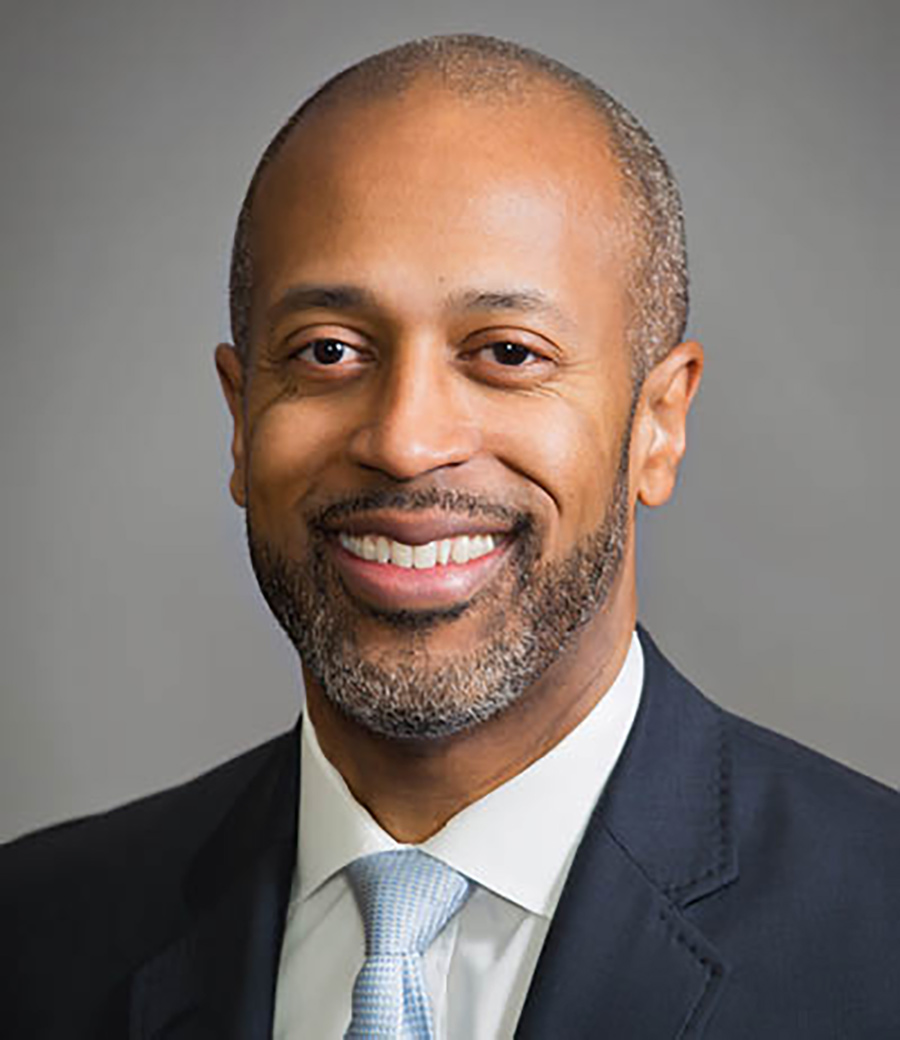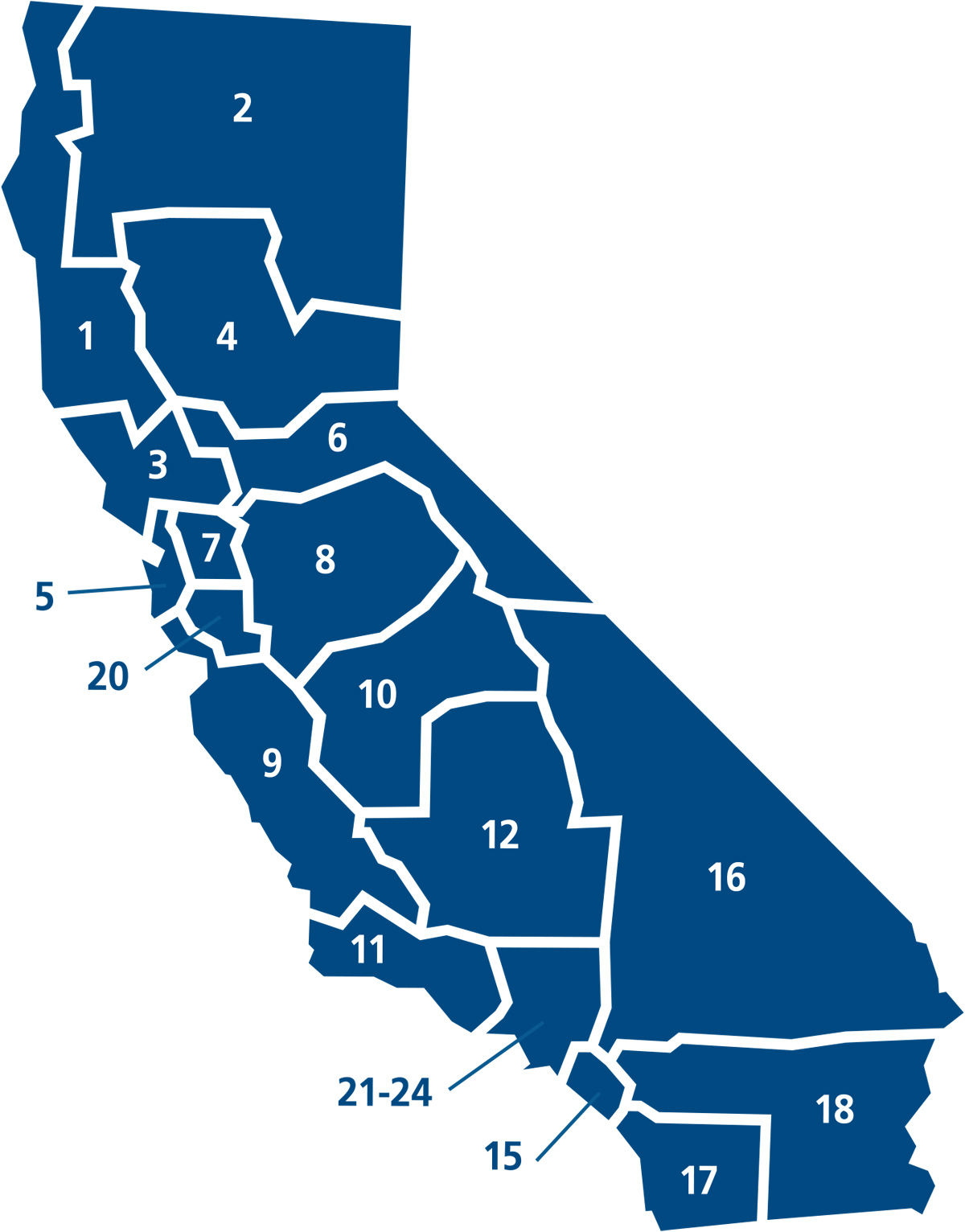

The most visible way in which CSBA supports members is through a combination of state and federal legislative advocacy, fighting to pass bills that will aid board members in their governance responsibilities and to defeat legislation that would be harmful to public schools. We also engage in extensive legal advocacy to support LEAs who are engaged in litigation of widespread import to California public schools. We are also recognized as the premier provider of training and professional development options for board members and governance teams. More than 90 percent of the LEAs in the state use GAMUT Policy services to access our sample board policies and administrative regulations to aid in their governance role. CSBA also produces original and groundbreaking research on issues of critical importance to LEAs and partners with businesses that serve public schools to make them more accessible and affordable.
CSBA regions

In sum, CSBA is a comprehensive and indispensable provider of resources, services, information and advocacy for LEA trustees.
CSBA’s strategic initiatives provide the framework for our mission of becoming the essential voice in public education and a roadmap to provide members the resources needed to excel in a governance role. The strategic initiatives are developed by CSBA’s Board of Directors, so they reflect the perspective of elected officials governing the association, and by extension, the broader membership.
Our strategic priorities include:
- Provide member boards with quality education research, robust policy tools and support to equip them to create the equitable conditions for every student to succeed.
- Develop pertinent and interactive training that creates knowledgeable, engaged and competent local board members.
- Increase the number of governing board members CSBA mobilizes to leverage our collective voice and to advocate for public education at the local, state and federal levels.
- Pursue excellence in association leadership as the Board of Directors strives to achieve the guiding principles found in CSBA’s Vision, Mission and Equity statements.

Our expanded focus on research designed to elevate the school board perspective on education issues will increase public understanding for the challenges faced by district and county board members. It will also provide information and recommendations our legislative advocates can use to influence the debates in the Capitol related to public schools.
Our new District and County Office of Education Legal Services builds on the successful work of the Education Legal Alliance by allowing CSBA to establish an attorney–client relationship with our members and provide them with legal advice. Legal Services continues ELA’s legacy of advocacy but extends it to the local level by providing effective legal representation for individual districts.
Our Legal Services attorneys provide research assistance on district- or county-specific legal issues; respond to questions that require the preparation of memoranda or legal opinion; conduct discreet investigations; and evaluate discrimination, sexual harassment and conflict of interest claims. Our attorneys are also well-equipped for administrative agency proceedings and to provide assistance or representation in matters pending before various state agencies involving general and special education matters, special education compliance complaints, professional licensure issues and unfair labor practice complaints. It’s a service we are proud to provide for our members, and to do so at an affordable rate.
Finally, at a time when the conversations about public education and the debates in local school communities have become increasingly fractious, CSBA can provide a unifying force focused on what we have in common — which is greater than what divides us. By providing essential information, training and policies needed by LEAs of every description, as well as legislative and legal advocacy, CSBA can support LEAs as they engage in the core work of educating students.
Another challenge that CSBA is facing head-on is the continuous erosion of local control by state officials, something that has reached a fever-pitch this last year as legislators reacted to local situations with bills that overshadow local board governance. One such bill, Assembly Bill 1078, signed by Gov. Gavin Newsom in September, provides for immediate state intervention by the State Superintendent of Public Instruction if a district does not provide sufficient textbooks or instructional materials to its students. This could happen even before a district has the chance to remedy the situation itself — a blow to local control and one that could result in unintended consequences for LEAs by potentially making it harder for them to address textbook insufficiency directly. CSBA was successful in having provisions removed in earlier versions of the bill that would have further eroded local control, like a requirement that a district governing board get approval from the State Board of Education before making changes to district textbooks and instructional materials.
To help meet these challenges, CSBA continues to broaden the scope of our training programs significantly through more regional workshops and increasing the number of virtual trainings and webinars for those unable to travel to in-person sessions. We have also created a variety of trainings to better serve different audiences from new to seasoned trustees, and added a Masters in Governance® training designed specifically for county office of education trustees. That’s in addition to launching the Online Learning Center, the first online learning portal for school trustees.
Another challenge we are actively engaged in is making sure CSBA’s mission, values and goals are properly understood and that we are not being mispresented by those who don’t understand our perspective or by those seeking to undermine us through false narratives. As school debates have become more polarized, people are eager to assign organizations to binary categories of right or left — but that simply doesn’t apply to CSBA. We are student-centered, not politically driven in either direction. We make strategic decisions through a long-term lens designed to strengthen schools and provide the conditions for improved student outcomes.
CSBA is a non-partisan organization in America’s most populous and most diverse state, and we have a responsibility to all members LEAs — small and large, urban, suburban and rural. We strive to make pragmatic decisions that advance the cause of public education. CSBA’s policies and guidance reflect the current state of the law as decided by the state and federal legislatures, state and federal agencies, and the courts, not our personal perspective. We honor the democratic process and the rule of law and provide members with the information and advocacy needed to do the same, while also empowering them in their local governance role.
Rather than ongoing and increasing investment in special projects that have littered recent budgets, we would like to see those funds and any new monies directed toward a higher level of base funding. Further, we would like to see the state resume its traditional role in supporting facilities improvement and new construction on campuses throughout the state, particularly at a time when transitional kindergarten expansion, student safety and technology upgrades are burgeoning issues that impact overall student achievement.
More than anything, Sacramento needs to view itself as partner of local boards of education, empowering them to do good work, not as an overseer applying one-size-fits-all dictates to diverse local communities.

Furthermore, we’ve seemed to enter a stage of politics where false or misleading narratives on social media rule, boisterous attacks on individuals due to different policy perspective are deemed legitimate, and where the idea of letting every piece of legislation whether good or bad, have its day at a public hearing are no longer valued.
All of this seems to stem from the other major change, which is the increased polarization of politics locally, statewide and nationally. Greater partisanship in American society and the asymmetry presented by one-party government at the California state level create a markedly different political climate than the one I knew during my advocate days.
In addition to increased training opportunities for trustees, we now offer courses for student board members and executive assistants, so all of those involved in board governance have the knowledge and skills to effectively support student achievement.
We continue to grow CSBA’s Research and Education Policy Development (REPD) Department into an essential resource for information, analysis and insight about public schools, with a particular focus on the school governance perspective that helps shapes policy and legislation. At the same time, we have dramatically expanded our communications offerings with an increased number of digital public publications, reference books, videos, webinars and a larger social media presence. Through innovative business development partnerships like Golden State Technology Solutions and BuyBoard, we are helping LEAs to streamline their purchasing by saving time and money. We are also helping guide districts that are interested in exploring education workforce housing.
The scale of the growth at CSBA and the improvement in the service we offer is remarkable. It’s been a tremendous experience to date, and I look forward to what the future holds for me, for the association and for all of our members.